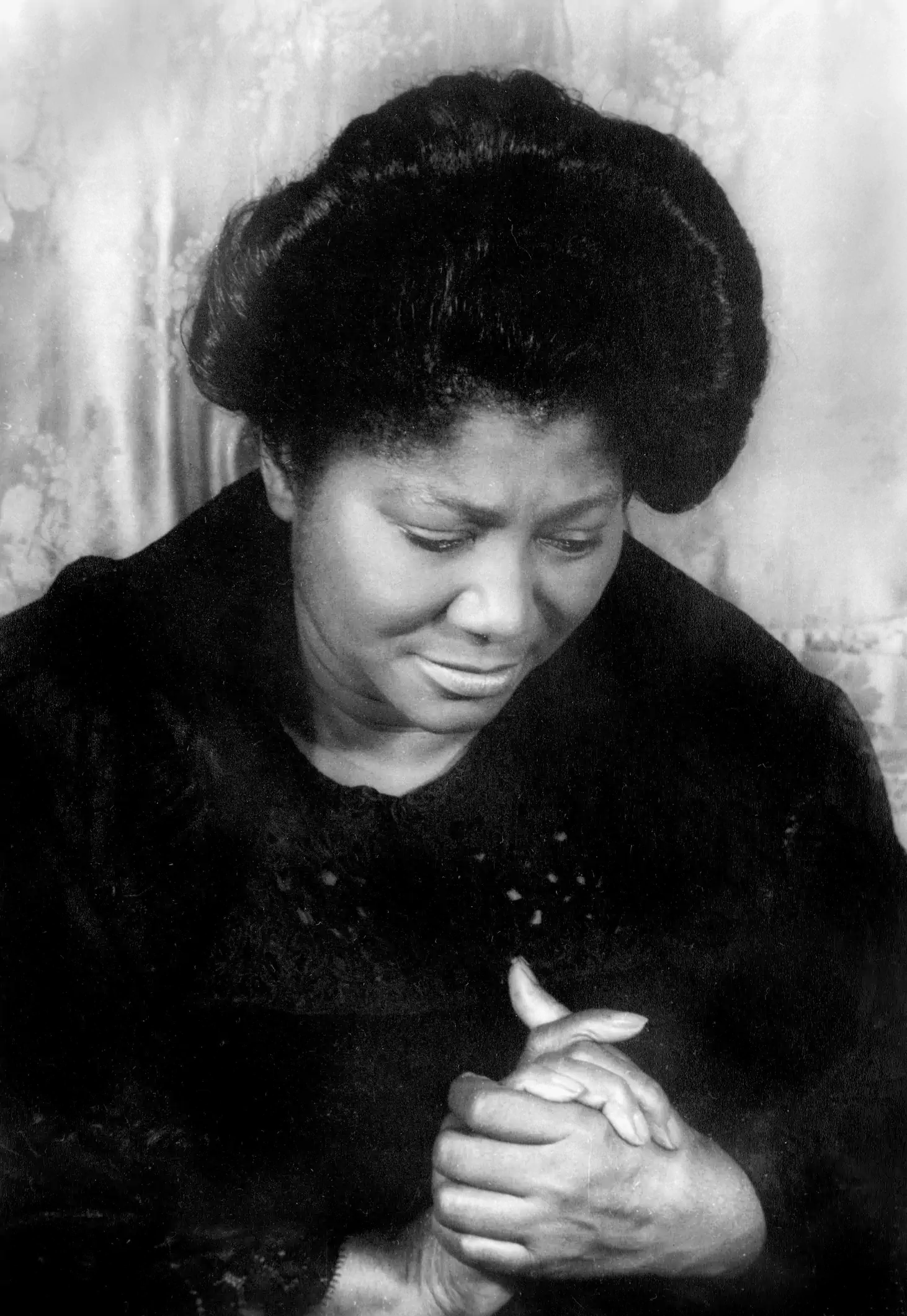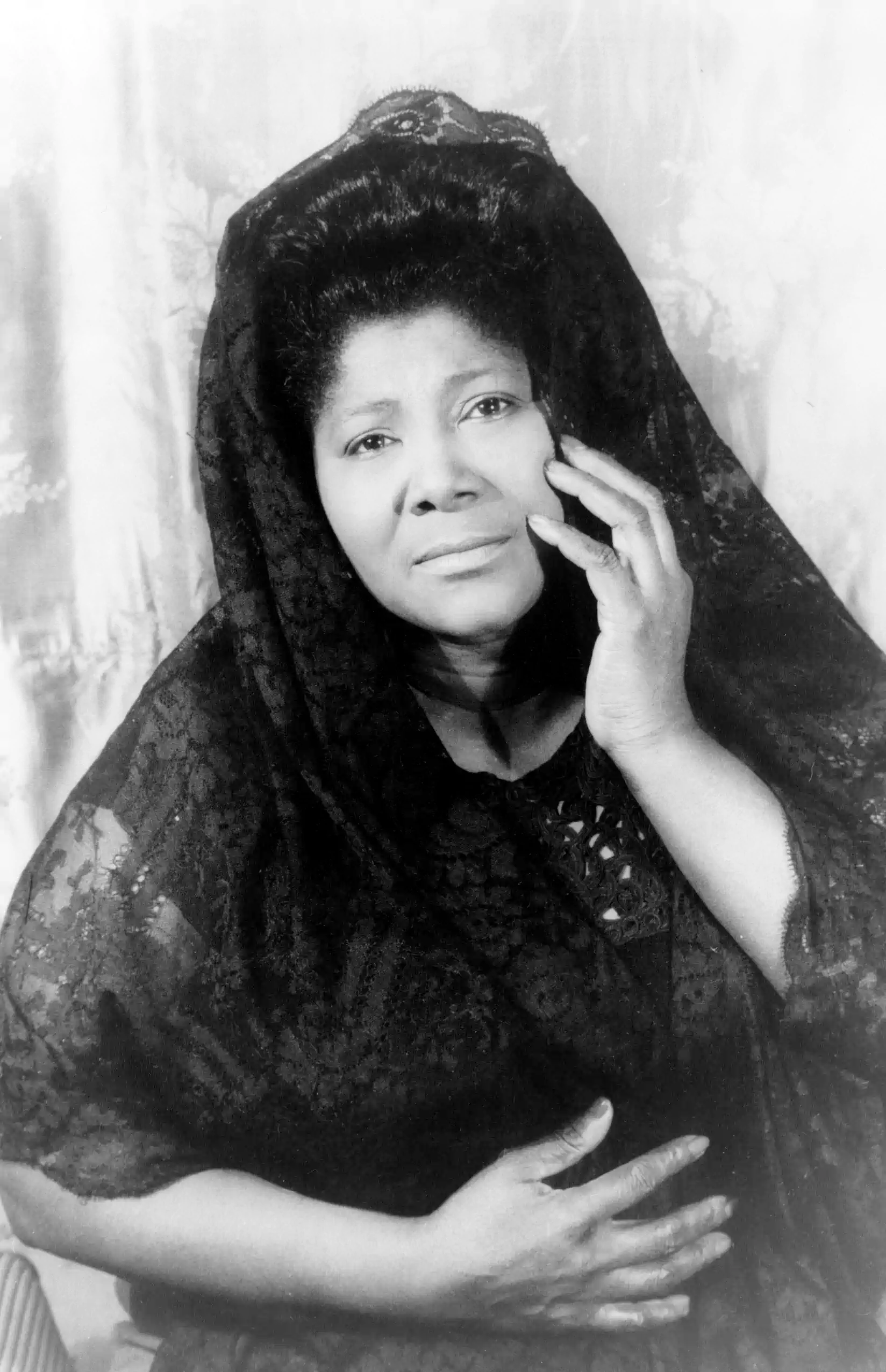Daily connection – A life of prayer
Mahalia's spiritual journey was marked by a daily discipline that she guarded like a precious treasure. She found inspiration and divine guidance not in fleeting moments, but in a conscious, daily search for God. Every morning she knelt down to thank her Creator for all the blessings she had received. The Bible was her constant companion, a beacon in stormy times. Especially in times of trouble, she sought comfort and guidance in its sacred pages.
Her prayer was a living dialogue that proved to be an anchor in the darkest hours of her life. When illness forced her to bed and fear of traveling overseas paralyzed her, it was prayer that gave her strength. She prayed not only for herself, but also for her beloved pianist Mildred, who was also battling illness: "Lord, get her through this, and me too." " Even after the painful divorce from her second husband, in the midst of loneliness, she found relief and comfort in her quiet conversations with God.
Mahalia's devotion was so deep that even after grueling tours, when her body cried out for rest, her spirit drove her to church. There, in the silence of God's house, she gave thanks to God and sang to His glory—an act of worship that triumphed over all fatigue. For her, prayer was not just a consolation, but the only remedy in times of physical distress.

© Carl van Vechten/Alamy
The healing power
Mahalia firmly believed in the healing power of her voice and her deep religious fervor. She did not see herself as a healer, but as an instrument of God through which healing could flow. Countless testimonies told of people who experienced relief or even complete recovery during her performances. Mahalia always emphasized that it was not she who possessed the power, but God alone who was the healer.
In her own moments of weakness, she experienced the power of prayer firsthand. Her "gospel mother," Mother Gaye, once prayed for her with her hands on her head and spoke prophetic words: "The Lord will heal you." Mahalia received these words with deep joy and a feeling of having found divine power. Once, before a concert, when she was so ill that she couldn't even read her Bible, she asked Harry Lenetska to read Psalm 27 to her. What followed was a miraculous recovery and an inspired performance in which the pain disappeared on stage. This experience was repeated before a concert at St. Paul's Cathedral – proof of the inseparable connection between her faith and her physical condition.
Interestingly, Mahalia also recounted that a young Elvis Presley had sneaked into one of her church concerts in Mississippi as a child. She was convinced that his Pentecostal upbringing and growing up in such an environment explained a lot about his later soulful singing.
The message as sound
For Mahalia, gospel music was more than just singing—it was singing the "good news" and spreading that message to the world. Her music was a praise to God and a testimony to what He had done for His people. She categorically refused to sing jazz or blues because, while gospel gave hope and joy, blues wallowed in despair. For her, gospel was a "personal triumph over every difficulty, a solution to every problem, a little way to peace."
Her songs, such as "God Answers Prayers," "I'm Going to Tell God All About It," and "Pray Lord, Use Me," were direct reflections of her deep faith. Hymns such as "Amazing Grace" and "His Eye Is on the Sparrow" became powerful prayers that touched hearts when she sang them.
Mahalia's singing was a "sung meditation" in which the lyrics and message were of paramount importance, while melody and rhythm fulfilled their role as supporting elements.
The body in praise
Mahalia's singing was inseparable from her physical presence and emotional devotion.
She sang with her "body, hands, and feet" and used the word "demonstrate" in the sense of deep reflection on life. She was known for "lifting her dress a little above her ankles and performing a lively sacred dance in two steps" or moving around the stage and falling to her knees when the spirit moved her.
She was "carried away by the spirit," which meant that the extraordinary passion of her performances "literally took her out of herself." She said she was used to singing in church "until the Lord came" and the spirit manifested itself. This deep spiritual connection often led the audience to be swept away by her enthusiasm, as at a gospel service in Chicago, where the entire church eventually joined in singing.
Mahalia understood that the enthusiastic reactions in the churches—the shouting, dancing, clapping, and stomping—were expressions of communion with the Holy Spirit. Despite criticism of her physically expressive performances, she defended herself with biblical quotations such as Psalm 47: "Clap your hands, all you who are far away; shout to God with the voice of a trumpet."
A voice that heals
Mahalia Jackson was often considered an "evangelist." Her comments after concerts were "thoughtful, inspiring, and encouraging," as if an "angelic spirit" were speaking through her. She had the unique ability to connect with the feelings of her audience, even if they did not understand English. Through her singing, she led countless people to conversion.
For her, her concerts were not mere entertainment, but a "religious experience" and "religious ritual." Even at jazz festivals, she insisted on singing on Sundays to show her religious devotion and worship. She saw every concert hall as "just another church," because for her, God was everywhere. The churches themselves were like "gas stations" for her, where she could refuel her spirit.
Her dedication went beyond the stage. She provided personal pastoral care, visited the sick and imprisoned, and sang for them, which led to further conversions.
Integrity and Faith - The Uncompromising Path
Mahalia's life was a testament to her unyielding integrity.
She categorically rejected lucrative offers in show business and to sing jazz or blues, as she had vowed never to do so. She insisted that no "jazz chords" be used in her accompaniment. She resisted pressure to "commercialize" her music and reduce it to the formats desired by record companies, as she was accustomed to singing "until the spirit came."
She always emphasized the importance of making the message in her songs understandable. Mahalia's spiritual passion was not trained, but came from deep experience and instinct, not from sheet music. She couldn't distinguish between time signatures and told her musicians, "I just sing—follow me."
Mahalia Jackson's life and artistic work were deeply influenced by her faith and her personal relationship with God through prayer and meditation. Her music was a direct medium of proclamation, pastoral care, and worship that transcended church walls and touched and inspired people worldwide. She fought to preserve the spiritual authenticity of her music, even in the face of commercial pressure and societal expectations. Her vision of a temple underscored her desire for a place that was open to all and promoted healing and education in the spirit of the Gospel.
Mahalia Jackson's legacy lives on in every note, a timeless testament to the power of faith that moves hearts and touches souls.

© Carl v. Vechten / Science History Images/Alamy
Mediation – a source of contemplation
Beyond prayer and Bible study, she found another source of spiritual contemplation: the great waters. Whether on the high seas or on the banks of a river, these places of flow and vastness were portals to Mahalia's inner world, where she found peace, insight, and strength for her mission.
The porthole as a window to meditation
The most powerful description of Mahalia's meditative practice comes from a moment aboard the SS United States. It's a scene that shows her deep focus and fighting spirit. When Edward Robinson talks to her, she brushes him off.
"Just go, Edward," Mahalia said, not turning away from the porthole. "Can't you see I'm meditating? I have a burden on my heart, and I have the strength to pick it up. Baby, Mahalia is preparing to fight the demons."
These words paint a clear picture. This is not passive relaxation, but active, purposeful introspection. Active introspection is an apt definition of meditation.
Mahalia used the porthole not only as a window to the sea, but as a focal point for her meditation. It was a place where she faced her inner demons, took up her burdens, and prepared herself for life's challenges. The vastness of the ocean stretching out before her may have reflected the vastness of her own soul, where she sought strength.
In an excerpt from her personal diary, written between March 30 and April 4, 1961, aboard the SS United States, Mahalia Jackson described the effect the sea had on her:
SS United States, April 1:
"After sleeping for two days, I left my cabin at the urging of music director Meyer Davis, who kept asking me to attend a party for comedian Jackie Gleason. Finally, I got out of bed and mingled with the guests, but within an hour I was back in my cabin looking out the window at the beautiful water. I didn't know that water could have such an attraction for me. It was very interesting to observe the different shapes and forms of the water, the different waves and colors, the different moods and sounds."
Childhood dreams on the Mississippi
Mahalia's connection to bodies of water as places of contemplation began in her childhood on the Mississippi River. Here, too, she spoke of "meditative times" that shaped her soul: "I felt a certain joy there," she recalled of her meditative times by the river. She says she was always a child who thought about the future. "I felt like I could live better."
The river, which flows steadily and changes constantly, was a place where young Mahalia could reflect on the future. It was an environment that inspired her thoughts and made her feel that a better life was possible. This early influence of the Mississippi shows that, from childhood, proximity to flowing or expansive water was a source of inspiration, comfort, and spiritual connection for her.
The meditative power of water
Although Mahalia Jackson may not have always used the word "meditate" in our modern sense, it is clear that observing large bodies of water was a deeply spiritual and meditative practice for her.
It was a space of silence where she could:
Fought internal battles
The porthole became the focal point for coping with emotional burdens.
Hidden things revealed
The sea revealed its "song" to her, a metaphor for deep insights.
Connected to their future
The river served as a backdrop for childhood dreams and hopes for a better life.
Mahalia Jackson's way of meditating was as unique and powerful as her voice itself. She taught us that you don't necessarily have to sit on a meditation cushion to find inner peace. Sometimes it's enough to surrender to the flow of life or the vastness of the ocean – and there, in the endless movements of the water, hear the song of your own soul.
©Thilo Plaesser